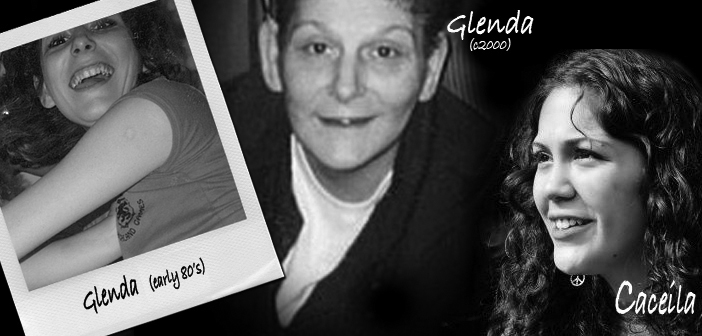Finding Glenda isn’t the end of the story.
Just over a month ago, when Caceila Doughty Trahan, 23 years old, set out to find her long lost mother after 14 years of radio silence she was expecting the worst. What were the odds that this woman, who had long suffered every colour of violence along the abuse spectrum as well as experiencing a diagnosis of paranoid schizophrenia and addictions, could be found alive? But she was.
Two weeks after reporting Glenda missing to the Sault Ste. Marie Police, Caceila’s mother was back on the radar. Just a few days ago, Caceila, living in Sudbury, Ontario, dialed up Vancouver, B.C. and heard her mother’s unforgotten lilt for the first time since she was 9 years old.
“I spent so much time trying to focus on her voice and picture her in my head all these years. Her voice sounds the same,” laughed Caceila through joyful tears.
We are sitting in her Dad’s home in Sault Ste. Marie eating scone dogs and drinking candy cane hot chocolate. Caceila is sitting cross legged on the couch, her left knee presses comfortably against a tear in her jeans and she is wearing a huge sweatshirt with the graphic ‘DAD’ written across the front. Caceila has been home from Sudbury for a few days doing double duty- visiting family and meeting with community leaders to discuss her idea to lead healing circles with various local groups.
Through the efforts of the Sault police and Caceila’s persistence, Glenda was ‘discovered’ to be living in a long-term care facility in Vancouver. Caceila’s first reaction was relief -her mother was sheltered, fed and receiving medical care. But to the best of Caceila’s knowledge her mother does not have outside support networks –family or friends, to keep an eye on Glenda’s wellbeing.
An investigation conducted by W5 in 2013 uncovered at least 1,500 cases of staff-to-resident abuse and neglect in nursing homes across Canada. That number is likely to be much higher due to under-reporting incidents. Though Caceila hasn’t any knowledge of Glenda being mistreated, one only needs to draw on recent events in history, including the residential school legacy and the ‘confinement’ of people with disabilities in government operated institutions, to feel moderately alarmed that Glenda may be without a non-paid advocate in her life.
“I’d like to see where she lives. I need to make sure that she is safe. It’s difficult to know how she is really doing relying just on phone calls and letters,” remarked Caceila.
Caceila feels a strong sense of urgency to recover a trusting relationship with her mother. Glenda’s condition and the distance between mother and daughter present obvious challenges. “Cognitively she is child-like,” shared Caceila. “She was happy to hear from me when I called but like with a child you need to be consistent and be in their memory.”
But it’s more than new memories that Caceila is after.
“For me it’s really pressing to build that relationship now so that in the future she’s not alone or if she has a health crisis that she has someone there to be with her. I’m not going to be able to reach out to her and she’s not going to reach out to me if we don’t build that bond. It’s hard to do from Ontario to Vancouver with phone calls and letters. Maybe I’m pretensing. Maybe nothing is wrong. But if there ever was, that’s what family is for. Or maybe she might want to celebrate something good. Someone to just share joy with.”
Caceila speaks quickly but is quiet for a moment.
“It’s been fourteen years, I’m ready to see my mom. I would just love to see my mom and hug her and see how she looks and identify her face to my face,” shared Caceila as she lightly touches her cheek.
I had the pleasure of meeting Caceila about five years ago when she was 18 years old. She struck me as an old soul. Caceila was just finding her voice as a youth poverty activist. She toured the local and regional circuit speaking courageously and passionately about her life. Caceila grew up without a present mother, experienced extreme poverty and suffered physical and sexual violence. Throughout her story she always credits her Dad as a wonderful and ever loving father.
Finding Glenda is just the beginning of a new journey for Caceila. It is an opportunity to confront and end generations of abuse in her family. Caceila openly sobs, tears flow down her cheeks and she presses her fingers to the corner of her eyes.
“I’m never going to get my childhood with my mom back and that’s ok. But a relationship with my mother now is not only important for my healing but it’s important for my kid’s that don’t even exist yet and the generations after that. There was abuse with my great-grandparents and I imagine my great-great-grandparents. My mother experienced extreme sexual violence. I myself have experienced domestic and sexual violence and poverty. I need to start healing so my future children can heal and maybe in a couple of generations things will change. I mean, really, all this pain and suffering is for nothing if we can’t change for the future.”
*A GoFundMe campaign has been established to reunite Caceila and her mother. Please click here to make a contribution. If you are unable to make a donation –that’s ok, reading and sharing this story helps too!


